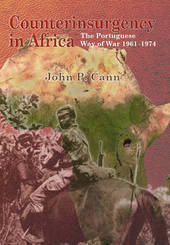
|
Counterinsurgency in Africa: The Portugese Way of War 1961-74
Paperback
Main Details
| Title |
Counterinsurgency in Africa: The Portugese Way of War 1961-74
|
| Authors and Contributors |
By (author) John P. Cann
|
| Physical Properties |
| Format:Paperback | | Pages:240 | | Dimensions(mm): Height 234,Width 156 |
|
| Category/Genre | African history
Colonialism and imperialism |
|---|
| ISBN/Barcode |
9781907677731
|
| Classifications | Dewey:967.0326 |
|---|
| Audience | |
|---|
| Illustrations |
16 b/w photos, 4 maps
|
|
Publishing Details |
| Publisher |
Helion & Company
|
| Imprint |
Helion & Company
|
| Publication Date |
15 February 2012 |
| Publication Country |
United Kingdom
|
Description
Portugal was the first colonial power to arrive in Africa and the last to leave. As other European states were granting independence to their African possessions, Portugal chose to stay and fight despite the small odds of success. That it did so successfully for thirteen years across the three fronts of Angola, Guine and Mozambique remains a remarkable achievement, particularly for a nation of such modest means. The Portugese approach to the conflict was distinct in that it sought to combine the two-pronged national strategy of containing the cost of the war and of spreading the burden to the colonies, with the solution on the battlefield. Even today Portugal's systematic and logical approach to its insurgency challenge holds valuable lessons for any nation forced to wage a small war on the cheap. John P. Cann's study is both wide-ranging and comprehensive, providing a description and analysis of Portugese counterinsurgency, including aspects such as intelligence and mobility, besides discussing social and logistical operations. Whilst discussing operations that took place during the 1960s and 1970s this study remains very relevant to present-day counterinsurgency operations.
Author Biography
John P. Cann is an Adjunct Research Staff Member at the Institute for Defense Analyses, a former Scholar-in-Residence at the University of Virginia, and the retired Professor of National Security Studies at Marine Corps University. He earned his doctorate in the Department of War Studies at King's College London in 1996 and subsequently published Counterinsurgency in Africa: The Portuguese Way of War, 1961-1974 and Brown Waters of Africa: Portuguese Riverine Warfare, 1961-1974. He is likewise the author of some thirty articles on conflict in Africa. He is a retired naval captain and flight officer specializing in open-ocean-reconnaissance aviation with a variety of aviation assignments, including command. He also served on the staffs of the Chief of Naval Operations and the Secretary of Defense and was awarded the Portuguese Medal of Dom Afonso Henriques and the Portuguese Navy Cross Medal. He is an Associate Member of the Academia de Marinha.
ReviewsDr. Cann's work draws primarily on his wide-ranging interviews of participants and decision-makers and on the extensive use of their personal papers. This original material is ably blended with published sources in both Portuguese and English to produce an informative, valuable, and readable account of the agonies and successes in the development of Portugal's counterinsurgency capabilities. Even today Portugal's systematic and logical approach to its insurgency challenge holds valuable lessons for any nation forced to wage a small war on the cheap * Lieutenant General Bernard E. Trainor, USMC (Ret), Harvard University, Cambridge, Massachusetts * Cann's book focuses exclusively on the military aspect of these operations breaking them down into subcomponents such as logistics, doctrinal development, intelligence and social operations. His in-depth analysis of these provides the reader with a clear understanding of the level of effort put forward by the Portuguese in proactively seeking to prepare and address the issues relating to onward colonial control. Drawing upon extensive interviews, firsthand accounts, primary source documents and an extensive additional bibliography Cann is able to trace the degree to which the Portuguese assumed risk in deciding to reorient their entire defence policy and posture. He is also able to show; however, that these decisions were not made easily or casually but with a vast degree of research and thought.The reader is left with a profound respect for the professionalism and capability of the Portuguese military leadership ... Cann's book is an outstanding study into the development and application of the doctrine and methods by which the Portuguese faced the challenges of the post-colonial world. His book should be mandatory reading for any nation looking to intervene into an asymmetric environment as it addresses both the social and military aspects of colonial/non-traditional style operations. Excellent production value and value for money; highly recommended. * Canadian Army Journal *
|